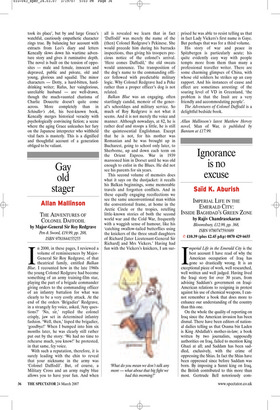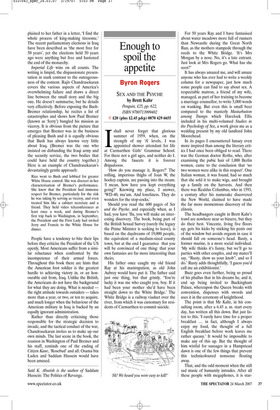Ignorance is no excuse
Saïd K. Aburish
IMPERIAL LIFE IN THE EMERALD CITY: INSIDE BAGHDAD’S GREEN ZONE by Rajiv Chandrasekaran Bloomsbury, £12.99, pp. 368, ISBN 9780747591689 ✆ £10.39 (plus £2.45 p&p) 0870 429 6655 Imperial Life in the Emerald City is the best account I have read of why the American occupation of Iraq has gone so drastically wrong. It is an exceptional piece of work, well researched, well written and well judged. Having lived the Iraqi story for over 30 years, from advising Saddam’s government on IraqiAmerican relations to resigning in protest against his use of chemical weapons, I cannot remember a book that does more to enhance our understanding of the country than this one.
On the whole the quality of reporting on Iraq since the American invasion has been dismal. There have been editors of national dailies telling us that Osama bin Laden is King Abdallah’s mother-in-law; a book written by two journalists, supposedly authorities on Iraq, failed to mention King Ghazi at all; and Saddam has been saddled, exclusively, with the crime of oppressing the Shias. In fact the Shias have been oppressed since before Saddam was born. By imposing a Sunni king on Iraq, the British contributed to this more than most. Gertrude Bell notoriously com plained to her father in a letter, ‘I find the whole process of king-making tiresome.’ The recent parliamentary elections in Iraq have been described as ‘the most free for 50 years’, yet the elections held 50 years ago were anything but free and hastened the end of the monarchy.
Imperial Life wins on all counts. The writing is limpid, the dispassionate presentation in stark contrast to the outrageousness of the content. Rajiv Chandrasekaran covers the various aspects of America’s overwhelming failure and draws a direct line between the small story and the big one. He doesn’t summarise, but he details very effectively. Before exposing the BushBremer relationship, he recites a list of catastrophes and shows how Paul Bremer (known as ‘Jerry’) bungled his mission as viceroy. It is obvious from the picture that emerges that Bremer was in the business of pleasing Bush and it is equally obvious that Bush has always known very little about Iraq. (Bremer was the one who insisted on disbanding the Iraqi army and the security service, the two bodies that could have held the country together.) Here is an example of Chandrasekaran’s devastatingly gentle approach:
Rice went to Bush and lobbied for greater White House control. She was discreet in her characterisation of Bremer’s performance. She knew that the President had immense respect for Bremer, particularly for the risk he was taking by serving as viceroy, and even treated him like a cabinet secretary and a friend. They held video teleconferences at least once a week, and during Bremer’s first trip back to Washington, in September, the President and the First Lady had invited Jerry and Francie to the White House for dinner.
People have a tendency to bite their lips before they criticise the President of the US openly. Most Americans suffer from a similar reluctance when confronted by the incompetence of their armed forces. Throughout this book there are hints that the American foot soldier is the greatest hurdle to achieving victory in, or an honourable exit from, Iraq. Unlike the British, the Americans do not have the background for what they are doing. What is needed the right attitude towards outsiders — takes more than a year, or two, or ten to acquire, and much longer when the behaviour of the American military in Iraq is backed by an equally ignorant administration.
Rather than directly criticising those responsible for the strategic decision to invade, and the tactical conduct of the war, Chandrasekaran invites us to make up our own minds. The last scene in the book, the reunion in Washington of Paul Bremer and his staff, reminds one of the ending of Citizen Kane, ‘Rosebud’ and all. Osama bin Laden and Saddam Hussein would have been amused.



















































































 Previous page
Previous page